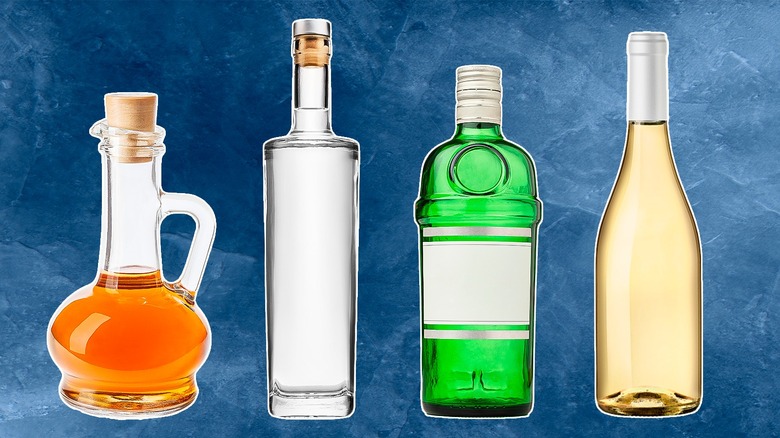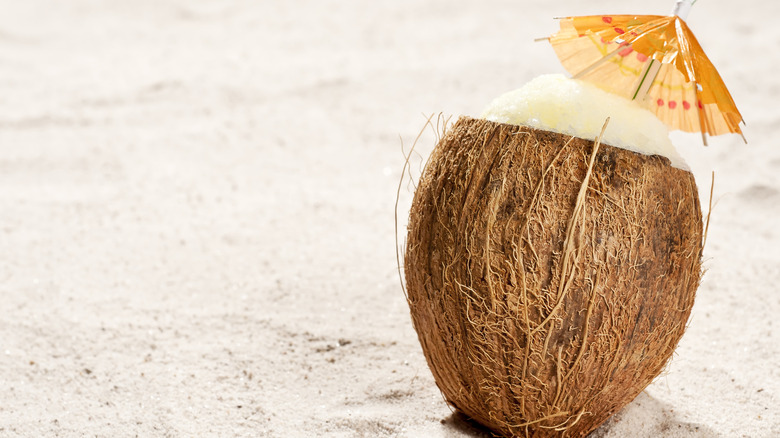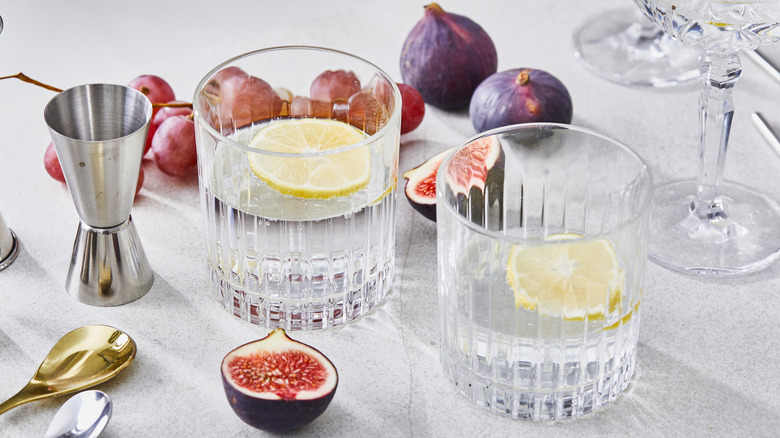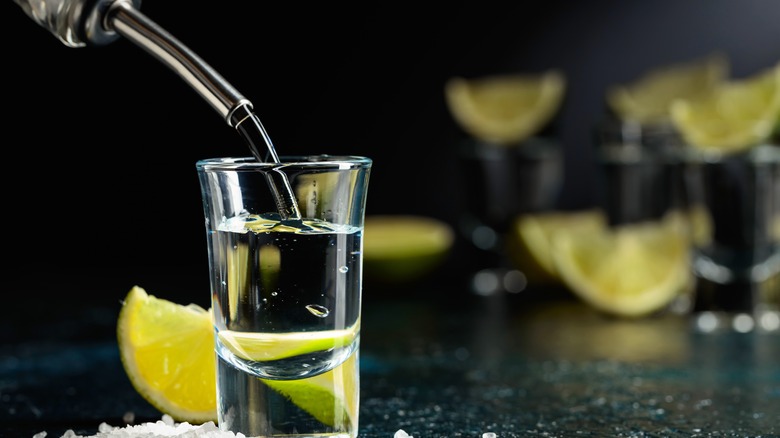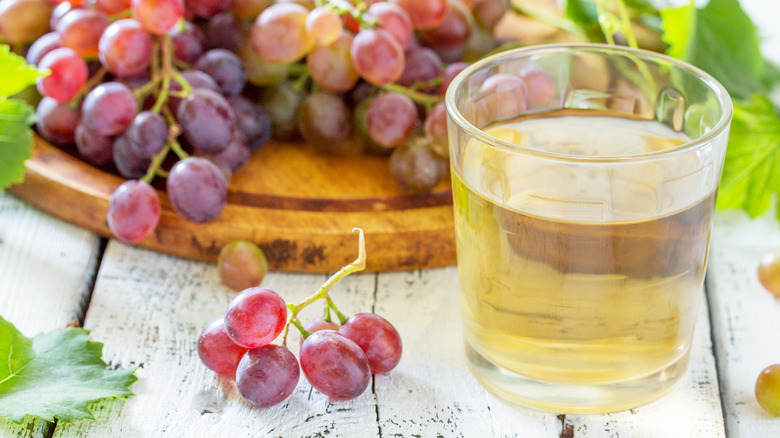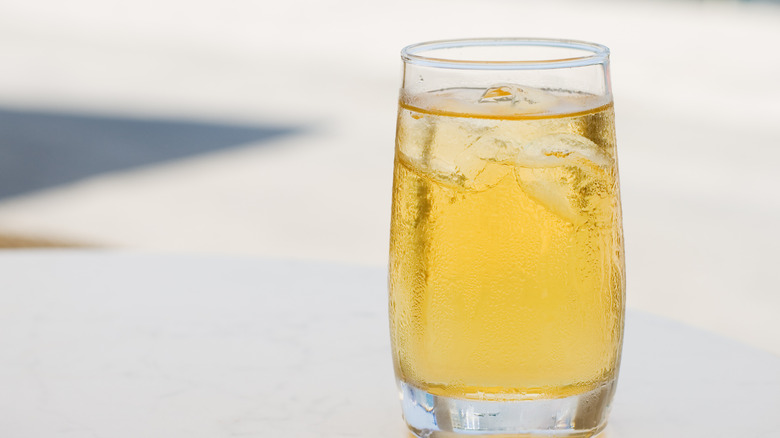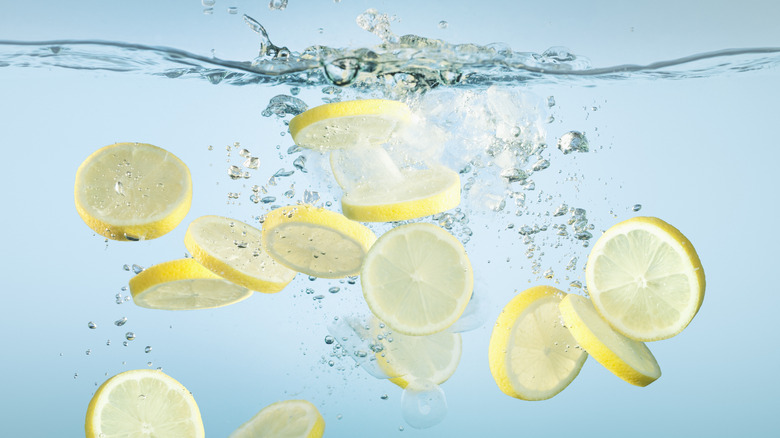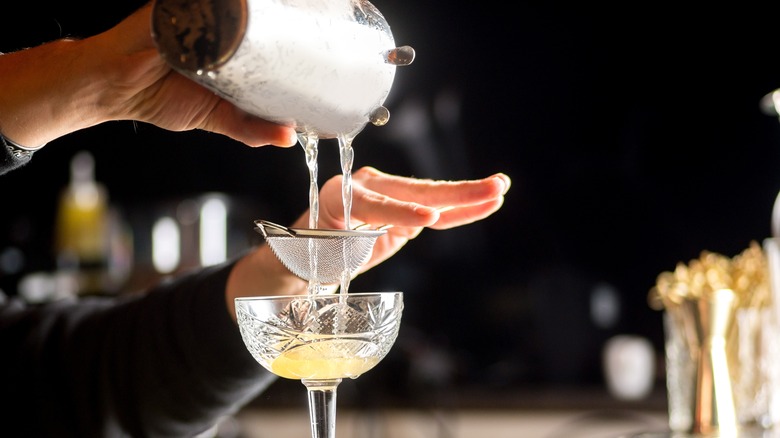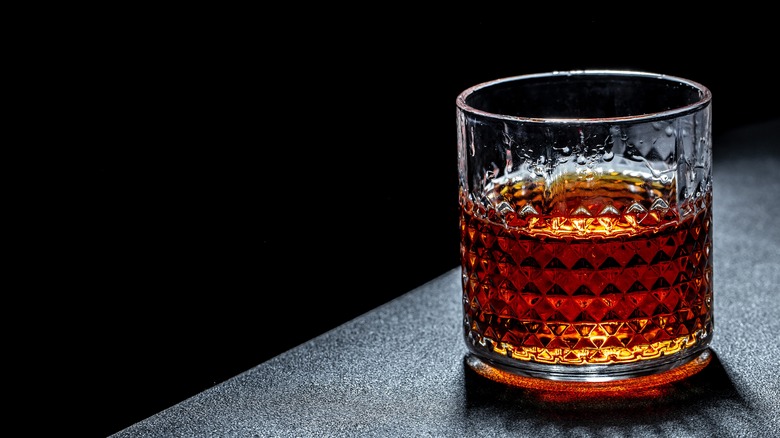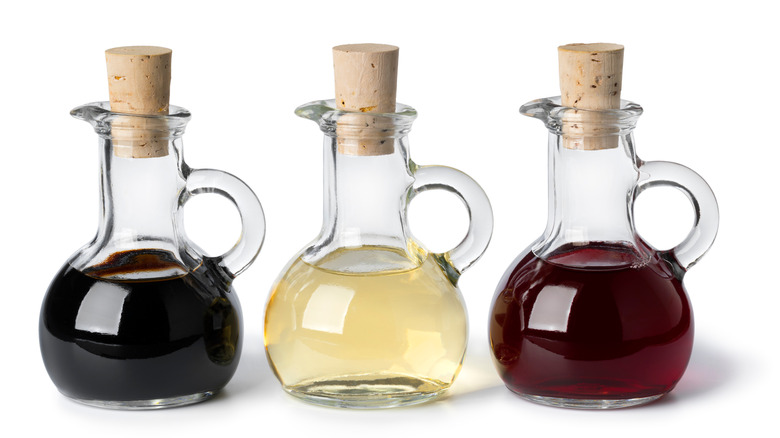12 Best Substitutes For Vodka In Cocktails And Cooking
Vodka, often a potato, fruit, or grain-based spirit, is a popular choice for many cocktails and recipes, but it's not right for every situation. Whether you're out of vodka at home, you just don't like it, or you're not a big drinker, don't let that stand in your way of making a solid cocktail or dish. Plenty of cocktail and cooking recipes out there use vodka, but there's always a way to modify recipes to fit your needs.
Whether you're trying to craft a classic cocktail or take on a new ambitious cooking project, try these substitutes for using vodka in cooking and cocktails. From lemon juice to apple cider to other spirits, each option is sure to add a different twist to whatever you're making. With the spirit of experimentation, these other options are a great way to substitute for vodka but add a new character to your dish or drink. Cheers to inventiveness.
Light rum
If you're out of vodka but happen to have some light rum lying around, use it as a substitute in your drink or dish. Rum, known for its complex sweetness, will add a molasses-y character, and depending on the rum you use, you could get some grassy or funky notes.
Light rum, which is aged either lightly or not at all, has a lighter flavor profile than dark rum. This neutrality in flavor and body makes it a good option for replacing vodka in any cocktail, from a classic rum and Coke to a mojito.
You can also use light rum in cooking to great effect. A good application for rum in cooking is in making a glaze or sauce — the sugars in the rum will help thicken your sauce up while adding complex flavors. To get you started, this trick would work well in a dish with your favorite protein and sweet, tart pineapple.
Another way to use rum is in desserts — and it's good for more than just bananas Foster. Try soaking cake in rum for a moist, sweet addition, or add it to your favorite ice cream recipe. Pro tip: Make a syrup out of the rum before adding it to your ice cream base so the alcohol cooks off and the frozen treat sets up properly.
Gin
It famously works in martinis, and it'll work in most other drinks you make — using gin as a substitute for vodka gives a slightly different twist on a lighter cocktail. Gin has a more botanical backbone than vodka does, thanks to the juniper it's famous for, which will add a slightly bitter flavor profile to your drink.
There are many different types of gin available on the market, from the classic London dry gin to the complex barrel-aged gin, so keep that in mind when putting together your cocktail or dish. For example, when making a sauce for a dessert, you might want to use the caramel-forward barrel-aged gin, whereas when making a simple sauce, you may want to opt for London dry.
When it comes to cocktails, start small with something like a gin and soda, or take it up a notch with a gin Cosmopolitan. Or, if you're feeling a little spicer, replace the vodka in a Bloody Mary with your favorite dry gin.
Another way to use gin instead of vodka is in a penne alla vodka-esque dish. The gin will cook off the same way the vodka would and will help thicken the sauce, but you'll be left with a slightly more complex and interesting flavor in your dish.
Blanco tequila
You might be used to using blanco tequila in margaritas or ordering late-night tequila shots with friends, but it's also a great substitute for vodka in many drinks and dishes. Whereas vodka is more neutral, blanco tequila will contribute an earthy flavor thanks to the agave it's crafted from. Keep in mind that there are plenty of blanco tequila varieties out there, and while no two bottles will give you the same results, it's worth exploring to figure out which is best for your needs.
You can use blanco tequila while cooking if you've run out of vodka or want to shake it up. Try deglazing your pan with tequila after preparing protein to get all the flavorful bits left behind by the cooking process.
Pro tip: When constructing a cocktail, try substituting vodka for tequila in a drink that has fruity notes for a flavor balance. Another solid path to take is to use tequila instead of vodka to elevate the flavors of your espresso martini. While the espresso flavor will still dominate the drink, the tequila will add a different, unique flavor profile, upping your espresso martini game immediately. Note that using a different spirit will change the overall vibe and flavor profile of the drink, but it's also a good opportunity to explore a new journey with your favorite drink. After all, what's life about if not experimenting?
Light whiskey
Moving past just light spirits, here's the dark horse substitute for vodka. Want to add some additional body and color to your cocktail or dish without overpowering the other components? Try using a light whiskey.
Contrary to what you might think, "light" doesn't mean that the whiskey is lower in alcohol. In fact, light whiskey is required to contain more than 80% ABV and less than 95%. "Light" is actually referring to the flavor of the whiskey, which is likely to be sweet and less strong-tasting than your typical whiskey. This type of whiskey's aging isn't as intense, which contributes to the flavor difference. History lesson: light whiskey came about in the U.S. in the 1960s, and while it isn't the most popular spirit out there, it has a following.
Try using light whiskey in any cocktail where you would typically use vodka for a twist on the drink's character. Also, light whiskey is a great contribution to any dish where you want to add deeper, richer flavors. Beyond savory applications, try using light whiskey when making a dessert — similar to rum, light whiskey would be good for making a syrup.
White grape juice and lime juice
If you're looking for a way to make your cocktail zero-proof or lower-proof and searching for a great way to add flavor and body to your sauces while cooking, try this hack. You won't even miss the vodka in your cocktail or dish with this simple and effective replacement.
White grape juice combined with tart lime juice makes for a perfectly balanced addition to your cocktail or dish. The white grape juice will add a pronounced sweetness to your concoction. But don't worry about that sweetness overpowering whatever you're making. The lime juice is a nice foil, cutting through some of the sweetness and contributing the slight hit of acidity you would get from vodka. This duo, used in the same proportions you would use for vodka, will ensure your cocktail has a dynamic flavor profile.
If you're using this substitution while cooking, it'll help you emulsify your sauce and deglaze your pan (which makes sense since that's something you can do when cooking with vodka). As with many of these substitutions, you can use this duo to add volume to your cocktails or sauces, ensuring your glass is filled appropriately and your food is sufficiently flavorful.
Apple cider and lime juice
This substitute has similar reasoning to the previous recommendation but will contribute a different flavor profile — a bit sweeter instead of super tart. The best part is that you probably already have these two ingredients kicking around in your kitchen as we speak.
Try combining apple cider with lime juice to imitate the aroma of vodka in your dish or cocktail. The apple cider will add sweetness to your cocktail or dish while the lime juice will cut the sweetness with its distinct tartness. This mixture will add a balanced flavor to any cocktail that typically requires vodka, or it'll help deglaze your pan or add body to your sauces made while cooking.
When it comes to cocktails, use this mixture to add a fruity sweet-tart pop. The apple cider can contribute a cozy vibe to any drink, so reach for this substitution when it's cold outside. There's no better way to welcome any guest during the cold months than with an apple cider drink. Don't sweat about overdoing the sweetness or tartness with this tip. Use apple cider and lime juice in the same proportion you would use for vodka in any recipe to avoid overpowering the other existing flavors in your cocktail or dish.
Lemon and water
We all know and love lemon water as a healthy option that's good for you to drink on its own, but have you considered using that combination as a component in your cocktails or dishes? Next time you need a substitute for vodka, add lemon to your water for use in anything you're whipping up from the bar cart to the stovetop.
Lemon, a common kitchen staple in many cases, can also be a heavy hitter in any drink or dish if you feel like experimenting a bit. The first benefit of this move is that the lemon water will add the sharp kick you're looking for from the vodka to your drink or dish. The concoction will also add volume to your project. This ensures that your cocktail lasts a bit longer and is a satisfying sipper with proper proportions, and also makes sure that your sauce or dish doesn't turn out too thick.
Water
If you don't have lemon lying around, no worries. Plain water can be used as a makeshift vodka substitute when your main concern is adding volume to drinks or dishes. You won't want to use this option if you're trying to make a vodka soda, but in drinks that have multiple components, water can be a great option if you're out of vodka.
For example, a Long Island Iced Tea has so many other kinds of liquor in it that you won't miss the vodka if you replace it with water. Or if you're looking for something still alcoholic but a bit less boozy, try making a White Russian with water instead of vodka — the Kahlua will pack the slight alcoholic punch needed to make the drink shine.
As far as cooking goes, you can use water to deglaze your pot or pan or thin your sauces out. But keep in mind that using plain water will not allow you to get the same flavor or aroma as vodka, so consider other flavoring agents, like lime juice, mentioned above, if you're looking to add a kick to whatever dish you're cooking.
Non-alcoholic spirits
For the best flavor match to a traditional vodka, try using a non-alcoholic spirit. There are plenty of non-alcoholic vodkas out there, meaning you no longer need to rely on that bottle of Tito's for your cocktails or sauces. Many places have stores specializing in non-alcoholic spirits, but if you can't find one, you can also order the inventive products online.
Use a non-alcoholic vodka the same way you would use a regular vodka — for example, if you're making a vodka soda, simply pour the non-alcoholic spirit in your jigger and add it to your soda water. When making a dish, you can use non-alcoholic vodka for similar results, but note that the resulting flavor might be slightly different.
From non-alcoholic gins to non-alcoholic blanco tequila, there are non-alcoholic versions of almost any spirit you can think of. That means if you feel like trying a different non-alcoholic spirit in a cocktail that traditionally includes vodka, you can run wild.
White wine
You can do more with white wine than just pouring it into a glass. Consider using it in any cocktail that requires vodka for an interesting, lower-ABV twist on the creation. With an ABV of 10-13%, white wine is a lot less alcoholic than vodka is. Because of this, white wine is the perfect way to make your cocktail more sessionable — but still delicious.
It's important to remember that different white wines will bring unique characteristics to your cocktails based on the types of grapes and conditions under which they're produced. If you're aiming for a smooth, round drink with buttery notes, try an oaked chardonnay. If you're looking for a crisp, grassy addition to your cocktail, grab a bottle of sauvignon blanc.
When it comes to cooking, white wine is the perfect addition to pastas and sauces. Use it to add extra flavor to your dish and to deglaze your pan to get all the bits at the bottom.
Young cognac
Quick history lesson: Cognac was created in the 16th century when the Dutch started distilling French wine into a different product — brandewijn, which was later known as brandy. Nowadays, only brandy from the Cognac region of France can truly be called cognac.
For all that history, it's got the taste to match, especially as a vodka substitute, especially if you want a deep, slightly sweet flavor in any cocktail or dish. Cognac, useful for more than just sipping, is great for sauces as it can add a caramel flavor or an oaky body to your creation.
Keep in mind that there are different distinctions of cognac based on aging duration. V.S. (very special) is aged at least 2 years while V.S.O.P. (Very Special Old Pale) is a blend with young cognac and is aged at least 4 years. X.O. (Extra Old) is also blended with young cognac and is aged at least 10 years. Hors d'âge (Beyond Age) refers to any cognac aged more than 10 years. Each of these styles will afford different flavor notes to your drink or dish. To get started, use very special to avoid flavor notes that will overpower your dish or cocktail — and as you hone your cognac knowledge, you can use the more aged varieties to add additional excitement to your concoctions.
White balsamic vinegar
If you're looking to add zippy flavor to your drink or dish, look no further than the versatile white balsamic vinegar. This ingredient works great for making a simple yet bright salad dressing, but it can be used for so much more than that.
White balsamic vinegar production begins with a white grape "must," which is made of the whole fruit — skins, seeds, fruit, and all. That mixture gets pressure-cooked and aged, and after some time, the finished product is ready for consumption.
While you can drink white balsamic vinegar by itself or mixed with water, it is also a superstar for adding fruity notes to your dish or cocktail. Try combining it with citrus or simple syrup in a fruity-leaning cocktail to create a fully balanced flavor profile. For a more creative option, you can use white balsamic vinegar in desserts. It's great on cakes or ice cream for a sweet yet tart experience.
